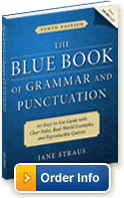|
Hi, Friend.
Welcome to your GrammarBook.com E-Newsletter.

"I found your Web site by accident, and I am glad I did. It has been a tremendous help."
- Pat B.
"I am glad I found your Web site to help me with my grammar."
-Annabelle W.
"I have been receiving your E-Newsletter for some time now. The information is timely, pertinent, and easy to read and understand. Thank you so much."
– Mary
"Word is spreading about how great your book is and the things you have available on the Web."
- Natalie F.
|
|
|
What Does vs. What Do
 Should we say, “What does Gloria and I have in common?” or “What do Gloria and I have in common?”
Should we say, “What does Gloria and I have in common?” or “What do Gloria and I have in common?”
If you turn the question around to place the subjects first, you would say, “Gloria and I does/do have what in common.”
Gloria and I are the subjects so we need a plural verb. Which verb is plural? We would say she does but we would say they do. So do is the plural verb. Therefore, the answer is, “What do Gloria and I have in common?”
Try this example: “What does/do the children look like in their costumes?”
If you turn the question around to place the subjects first, you would say, “The children does/do look like what in their costumes.”
Because children is a plural subject, we again need the plural verb do.
Try this example: “What does/do the coach expect from the team?
Turning the question around, we realize that our subject is coach, which is singular. Therefore, we would say, “What does the coach expect from the team?”
Due to the E-Newsletter's large readership, we are unable to respond to individual English usage questions. |
|
Pop Quiz
Choose the correct word in each sentence below. Scroll down to view answers.
1. What does/do she look like without makeup?
2. What does/do you and your husband think of the movie?
3. What does/do the team uniform look like?
4. What does/do the team members think of the new coach?
Free BONUS Quiz For You!
Friend, because you are a subscriber to the newsletter, you get access to one of the Subscription Members-Only Quizzes. Click here to take a Subject and Verb Agreement Quiz and get your scores and explanations instantly!

"So convenient...hundreds of quizzes in one click."
Friend, Subscribe to receive hundreds of English usage quizzes not found anywhere else!
- Take the quizzes online or download and copy them.
- Get scored instantly.
- Find explanations for every quiz answer.
- Reproduce the quizzes to your heart's content.
- EASY to use.
- No software to download.
- No setup time.
- A real person to help you if you have any questions!
"Fun to test my skills!" "The explanations really help...thanks!"
Your choice: Subscribe at the $29.95 or $99.95 level ($30 off - regularly $129.95).
"I download the quizzes for my students who don't have computer access."
Subscribe today to receive hundreds of English usage quizzes not found anywhere else!
"Makes learning English FUN!"
 |
Don't need all the quizzes at once?
You can now purchase the same quizzes individually for ONLY 99¢ each. Purchase yours here. |

Get Yours Today!
Get Amazon’s #1 Bestseller in Four Categories!
#1 in Grammar
#1 in Reading
#1 in Lesson Planning
#1 in Vocabulary |
The Blue Book of Grammar
and Punctuation by Jane Straus
An indispensable tool for busy professionals, teachers, students, homeschool families, editors, writers, and proofreaders.
Now available in print AND as an e-Book! Over 2000 copies are purchased every month!
Order Your Copy Today!
- Hundreds of Grammar, Punctuation, Capitalization, and Usage Rules
- Real-World Examples
- Spelling / Vocabulary / Confusing Words
- Quizzes with Answers
|
View the entire contents online
Discounts available for schools, bookstores, and multiple copies. Order Today!
Wordplay
 The Surprising Origins of Common Words The Surprising Origins of Common Words
submitted by Tim Handorf of BestCollegesOnline.net
Addict: Roman soldiers were given slaves known as addicts as rewards for good battle performances. The English version of the word comes from the Latin addictus, meaning “to deliver,” or “to sacrifice.” Hence the phrase “slave to an addiction,” which is actually kind of redundant.
Pop Quiz Answers
1. What does she look like without makeup?
2. What do you and your husband think of the movie?
3. What does the team uniform look like?
4. What do the team members think of the new coach?
Learn all about who and whom, affect and effect, subjects and verbs, adjectives and adverbs, commas, semicolons, quotation marks, and much more by just sitting back and enjoying these easy-to-follow lessons. Tell your colleagues (and boss), children, teachers, and friends. Click here to watch.
|